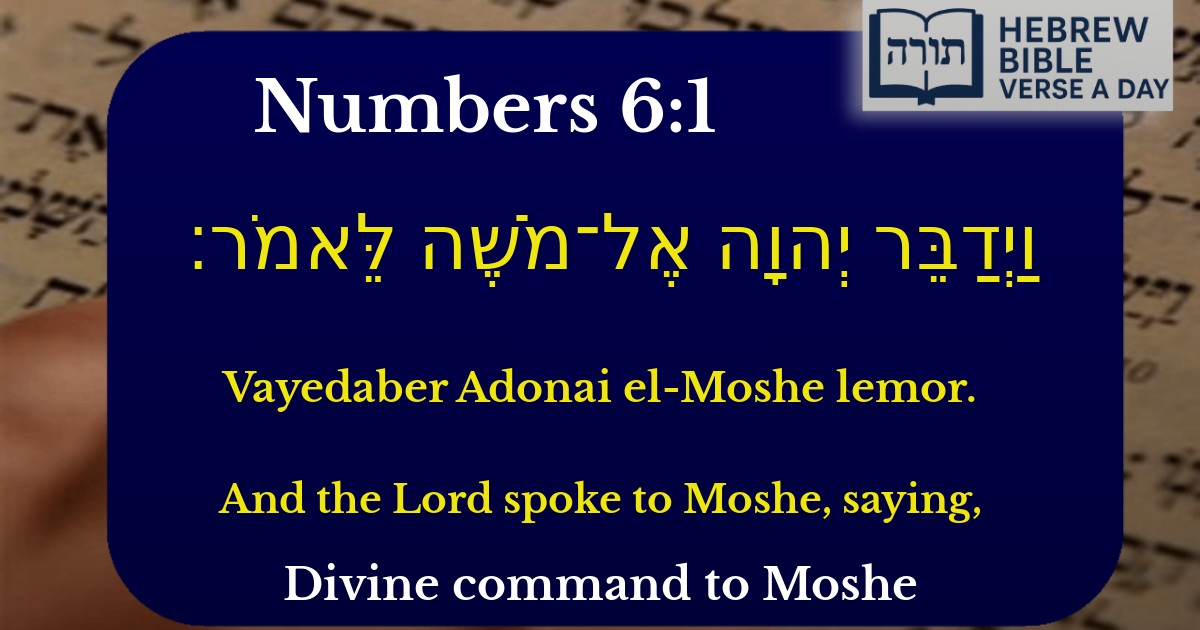Frequently Asked Questions
Q: What does 'And the Lord spoke to Moshe, saying' mean in Numbers 6:1?
A: This phrase introduces a new divine communication where Hashem gives instructions to Moshe. According to Rashi, this standard Torah phrasing emphasizes that Moshe faithfully transmitted exactly what he heard from Hashem to the Jewish people.
Q: Why does the Torah repeat 'saying' after 'spoke' in Numbers 6:1?
A: The double language of 'spoke... saying' teaches that Moshe was commanded to repeat these words to others. The Talmud (Yoma 4b) explains this phrasing indicates Moshe was to transmit these words to Aharon and his sons, and through them to all of Israel.
Q: How many times does this phrase appear in the Torah?
A: The exact phrase 'And the Lord spoke to Moshe, saying' appears over 70 times in the Torah. The Rambam notes this repetition shows the continuous nature of prophecy and how Moshe received commandments directly from Hashem throughout the wilderness journey.
Q: What is the significance of Numbers 6:1 introducing the Nazir laws?
A: This verse introduces the laws of the Nazirite (Numbers 6:1-21). The Midrash (Bamidbar Rabbah 10:1) explains the placement teaches that just as Moshe heard directly from Hashem, one who takes a Nazirite vow separates themselves to come closer to Hashem's service.
Q: What can we learn today from 'And the Lord spoke to Moshe'?
A: This teaches the importance of clear transmission of Torah. As the Sifrei states, Moshe's role as intermediary shows we must learn Torah from proper teachers who faithfully transmit authentic tradition, just as Moshe received and taught Hashem's words exactly.


The Divine Communication to Moshe
The verse "וַיְדַבֵּר יְהוָה אֶל־מֹשֶׁה לֵּאמֹר" ("And the Lord spoke to Moshe, saying") appears frequently in the Torah, marking the transmission of divine commandments and teachings. Rashi (Shemot 6:2) explains that this phrase emphasizes the direct and unmediated communication between Hashem and Moshe, distinguishing Moshe's prophecy from that of other prophets, who often received messages through visions or dreams (Bamidbar 12:6-8).
The Significance of "לֵּאמֹר" ("Saying")
The word "לֵּאמֹר" is interpreted by the Midrash (Shemot Rabbah 28:6) as an instruction for Moshe to relay the divine words exactly as they were given, without adding or omitting anything. Rambam (Hilchos Yesodei HaTorah 7:6) elaborates that Moshe's role as the transmitter of Torah required absolute fidelity to the divine message, ensuring its preservation for future generations.
Moshe's Unique Prophetic Status
This verse underscores Moshe's unparalleled prophetic level, as discussed in the Talmud (Yevamos 49b):
Theological Implications
The Ramban (Introduction to Sefer Shemos) notes that this recurring phrase reinforces the Torah's divine origin. Each commandment stems directly from Hashem's will, transmitted through Moshe without human alteration. This principle is foundational to the Orthodox Jewish belief in Torah min HaShamayim (the divine revelation at Sinai).